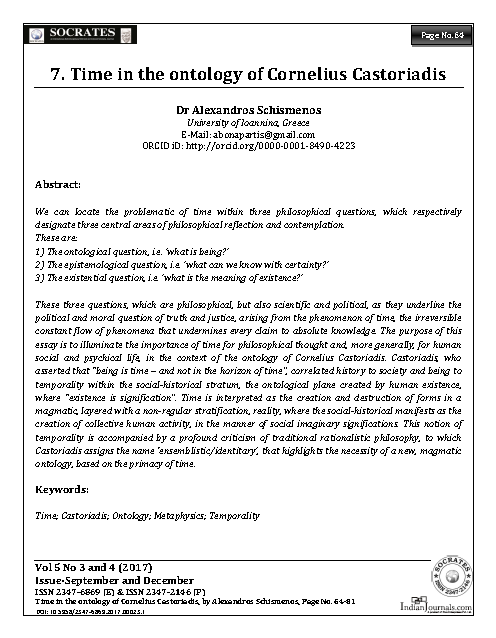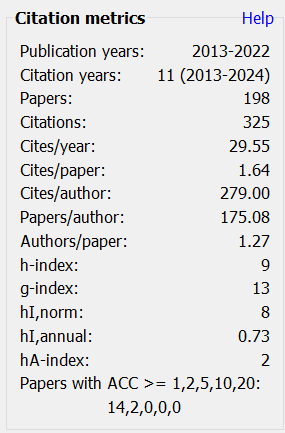Time in the ontology of Cornelius Castoriadis
DOI:
https://doi.org/10.5958/2347-6869.2017.00023.1Keywords:
Castoriadis, Time, Temporality, Society, History, AutonomyAbstract
We can locate the problematic of time within three philosophical questions, which respectively designate three central areas of philosophical reflection and contemplation.
These are:
1) The ontological question, i.e. 'what is being?'
2) The epistemological question, i.e. 'what can we know with certainty?'
3) The existential question, i.e. 'what is the meaning of existence?'
These three questions, which are philosophical, but also scientific and political, as they underline the political and moral question of truth and justice, arising from the phenomenon of time, the irreversible constant flow of phenomena that undermines every claim to absolute knowledge. The purpose of this essay is to illuminate the importance of time for philosophical thought and, more generally, for human social and psychical life, in the context of the ontology of Cornelius Castoriadis. Castoriadis, who asserted that “being is time – and not in the horizon of time”, correlated history to society and being to temporality within the social-historical stratum, the ontological plane created by human existence, where “existence is signification”. Time is interpreted as the creation and destruction of forms in a magmatic, layered with a non-regular stratification, reality, where the social-historical manifests as the creation of collective human activity, in the manner of social imaginary significations. This notion of temporality is accompanied by a profound criticism of traditional rationalistic philosophy, to which Castoriadis assigns the name ‘ensemblistic/identitary’, that highlights the necessity of a new, magmatic ontology, based on the primacy of time.
DOI: 10.5958/2347-6869.2017.00023.1
Downloads
Metrics
References
Augustine. (1961). Confessions. London: Penguin Books.
Castoriadis, C. (1999 ). Domaines de l'homme. Paris: Seuil.
Castoriadis, C. (1988). Protes Dokimes. Athens: Ypsilon.
Castoriadis, C. (1997a). World in Fragments. Stanford: Stanford University Press.
Castoriadis, C. (1997b). The Castoriadis Reader (D.A.Curtis, Ed.). Oxford: Blackwell.
Castoriadis, C. (1998 ). The Imaginary Institution of Society. Cambridge: MIT Press.
Castoriadis, C. (2007). Figures of the Thinkable. Stanford: Stanford University Press.
Castoriadis, C. (2008). Fait e à faire. Les Carrefours du labyrinthe. Paris: Points.
Maturana, H. R., & Varela, F. (1980). Autopoiesis and cognition: the realization of the living. Boston: D. Reidel Pub. Co.
Plato. (2001). Timaeus. Indianapolis: Hackett Publishing.
Thucydides. (1990). Histories Books I-II. London: Loeb Classical Library.
Waismann, F. (1967). Ludwig Wittgenstein und der Wiener Kreis. Oxford: Blackwell Publisher.

Downloads
Published
How to Cite
Issue
Section
License
Copyright (c) 2018 Schismenos Alexandros

This work is licensed under a Creative Commons Attribution-NonCommercial 4.0 International License.
Revised Copyright/CC license that applies to all the articles published after 05-02-2017
Attribution-NonCommercial 4.0 International (CC BY-NC 4.0)

Copyright/CC license that applies to all the articles published before 05-02-2017
Attribution-Non Commercial-No Derivatives 4.0 International (CC BY-NC-ND 4.0)

Author(s) will retain all the right except commercial and re-publishing rights. In the case of re-publishing, they will have to obtain written permission from the journal. Additional licensing agreements (Creative Commons licenses) grants rights to readers to copy, distribute, display and perform the work as long as you give the original author(s) credit, they can not use the works for commercial purposes and are not allowed to alter, transform, or build upon the work. For any reuse or distribution, readers and users must make clear to others the license terms of this work. Any of these conditions can be waived if you get permission from the copyright holders. Nothing in this license impairs or restricts the authors’ rights. To view a copy of this license, visit http://creativecommons.org/licenses/by-nc-nd/4.0/ or send a letter to Creative Commons, 171 Second Street, Suite 300, San Francisco, California, 94105, USA.
Research Papers published in SOCRATES are licensed under an Attribution-NonCommercial-NoDerivatives 4.0 International (CC BY-NC-ND 4.0)
















